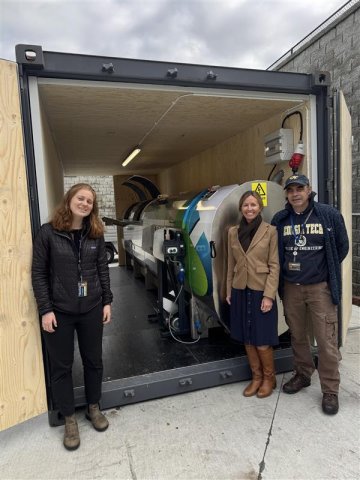
Pictured left to right: Members of the Office of Sustainability Abby Bower, Jennifer Chirico, and Steve Place welcome the new large-scale compost vessel to campus.
A grant from the Georgia Environmental Protection Division enabled the acquisition of the large-scale compost vessel.
Georgia Tech recently received its first large-scale composter, providing a closed-loop mechanism for processing food waste and other organic materials on campus. The Georgia Environmental Protection Division awarded a Recycling and Waste Diversion grant to the Office of Sustainability in 2024, enabling the acquisition of the composter.
It is the first of its size for an urban campus in Georgia and one of the very few in the Southeast. By continuously mixing organic material to introduce oxygen under ideal temperatures, the composter accelerates the natural decomposition process within a contained vessel. This technology enables composting to occur more quickly and requires less space than other methods. With a 1,000-pound daily capacity, the machine is anticipated to process up to 175 tons of organics per year — nearly half of the approximately 400 tons that Georgia Tech composts annually.
Associate Vice President of Sustainability Jennifer Chirico identified the need for an on-site composting option to reduce food waste diversion costs. “We are thrilled to see this effort come to life in support of our zero-waste and circular economy goals in alignment with the Institute’s strategic plan and multiple other strategic initiatives,” Chirico said. “This project represents an incredible amount of hard work from our office. I want to thank Shan Arora, director of The Kendeda Building for Innovative Sustainable Design, for his support in writing the grant, and Program and Portfolio Manager for the Office of Sustainability Abby Bower for her hard work in bringing the compost to full implementation.”
Current compost locations include campus dining halls, Tech Catering, John Lewis Student Center Dining, Kaldi’s Coffee, Carnegie Kitchen, residence halls, and two academic buildings; however, expanding service is essential to diverting more waste from the landfill and meeting our Institute zero waste goals.
“Our first goal is always to reduce the total amount of waste we generate, but with existing technology and practices, we still need a way to sustainably dispose of unrecoverable food, compostable products, and landscape debris,” said Bower. “This technology will enable us to increase the amount that we compost and keep it here on campus. We are excited to share this initiative with our campus community.”
A ribbon-cutting ceremony is planned in the Infrastructure and Sustainability Resource Recovery Yard, located off Tech Parkway, on Thursday, Nov. 13, at 1 p.m. The Office of Sustainability invites students, staff, and faculty to join us to learn how the compost vessel works and tour the new yard. Please RSVP here. Operations are expected to begin this fall, with expanded collection starting in Spring 2026. For more information or to get involved, contact sustain@gatech.edu.